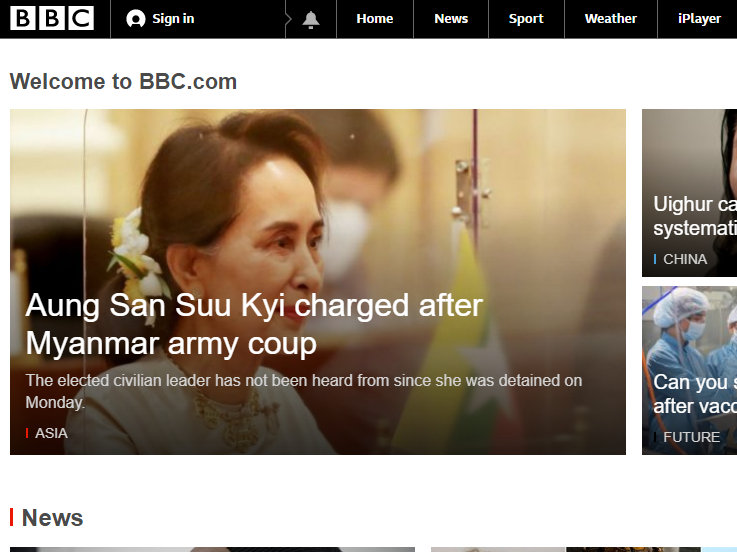
The BBC has suggested it could look into launching a subscription model for its global news services after seeing other news providers try it with “significant success”.
BBC Global News, which provides international English language news services overseas via the BBC World News channel and BBC.com, has generated annual revenues of around £115m for the past five years.
But its financial model, based on advertising sales and licensing to other media companies that offer its channel to their subscribers, is under pressure due to “changes in the way people access news and downward pressure on global advertising revenues,” the broadcaster said.
Large states like Russia and China investing in English-language news has also squeezed the BBC’s opportunities.
In addition the BBC said the Covid-19 pandemic had a “dramatic impact” on its ability to generate income for its global news service despite demand being higher than ever before, a challenge faced by many online news providers amid an advertising slowdown and keyword blocking of coronavirus-related stories.
In a financial report published on Wednesday, the BBC said it therefore expects to see a “significant impact” on revenues at Global News in the 2020/21 financial year and beyond.
But it added: “At the same time, some news providers have begun to have significant success through a direct to consumer subscription model.
“We will continue to consider how GNL can best operate in the market to ensure long-term commercial success in the face of current global news market challenges.”
[Read more: Strong subscription growth softens Covid-19 advertising blow for UK publishers]
Many UK news publishers have seen subscriptions growth soften the blow from the Covid-19 advertising downturn in the past year as consumers prove increasingly willing to pay for trusted brands.
BBC Global News faced a “significant challenge” to stay profitable even before Covid-19 hit and was told to reduce costs by £12m a year by the National Audit Office in 2018.
But audience demand remains high, with the BBC World News TV channel growing by 12% year-on-year to reach 112m people per week in 2020 while the brand reached 45m people per week across BBC.com and social media, up 6.8%.
A transformation programme is currently ongoing at BBC News to make £80m in savings by 2021/22 and free up more resources for a digital news strategy.
The changes underway include moving to a “story-led” model of
journalism instead of different programmes operating in silos and doubling up.
A minimum 800 roles, mostly in editorial, are in the process of being cut from BBC News and BBC England, Wales, Scotland and Northern Ireland.
Overall the BBC warned it might need to make “difficult choices” that impact its programmes and services if it is forced to continue tightening its belt.
The Value for Audiences report revealed that the broadcaster has seen a 30% real-term reduction in its income in the last decade, in part because of a five-year freeze on licence fee increases which was introduced in 2010.
Meanwhile it has been forced to fund more things, including taking over the funding of the World Service and Welsh language TV broadcaster S4C, which were both formerly financed by central Government.
The BBC’s savings programme is on course to deliver £951m worth of savings by the end of March next year, the report said.
The corporation said that so far it had managed to fund cuts by becoming more efficient, but added that this might be difficult going forward.
“However, given the BBC’s last ten years of work to deliver significant gains in productivity, the report identifies that further savings will involve difficult choices that will impact programmes and service,” a statement from the broadcaster said.
The report added: “As evidenced in this report, additional savings through productivity gains are becoming increasingly difficult and scope savings are now the predominant form of savings for the BBC.
“In order for the BBC to deliver its public service commitments, support the creative industries and continue to invest in high-quality, world-class, distinctive content for UK audiences, it will have to do more with less income to spend on programmes and services.”
A National Audit Office report last week noted that BBC licence fee income had fallen to £3.5bn in 2019/20 – down £310m in the space of three years due to the government’s decision to make the corporation cover the cost of free TV licences for the over 75s.
However the report noted that the overall impact of Covid-19 had been less serious than expected.
The BBC had expected to make savings of £125m a year to offset the impact of the pandemic. However, in October 2020 the BBC forecast that
licence fee income would be £132 million higher in 2020-21 than it had expected in April 2020 when initially forecasting the impact of Covid-19.
Additional reporting from PA Media
[Read more: How magazine publishers are turning subscriptions into membership programmes post-Covid]
Email pged@pressgazette.co.uk to point out mistakes, provide story tips or send in a letter for publication on our "Letters Page" blog
